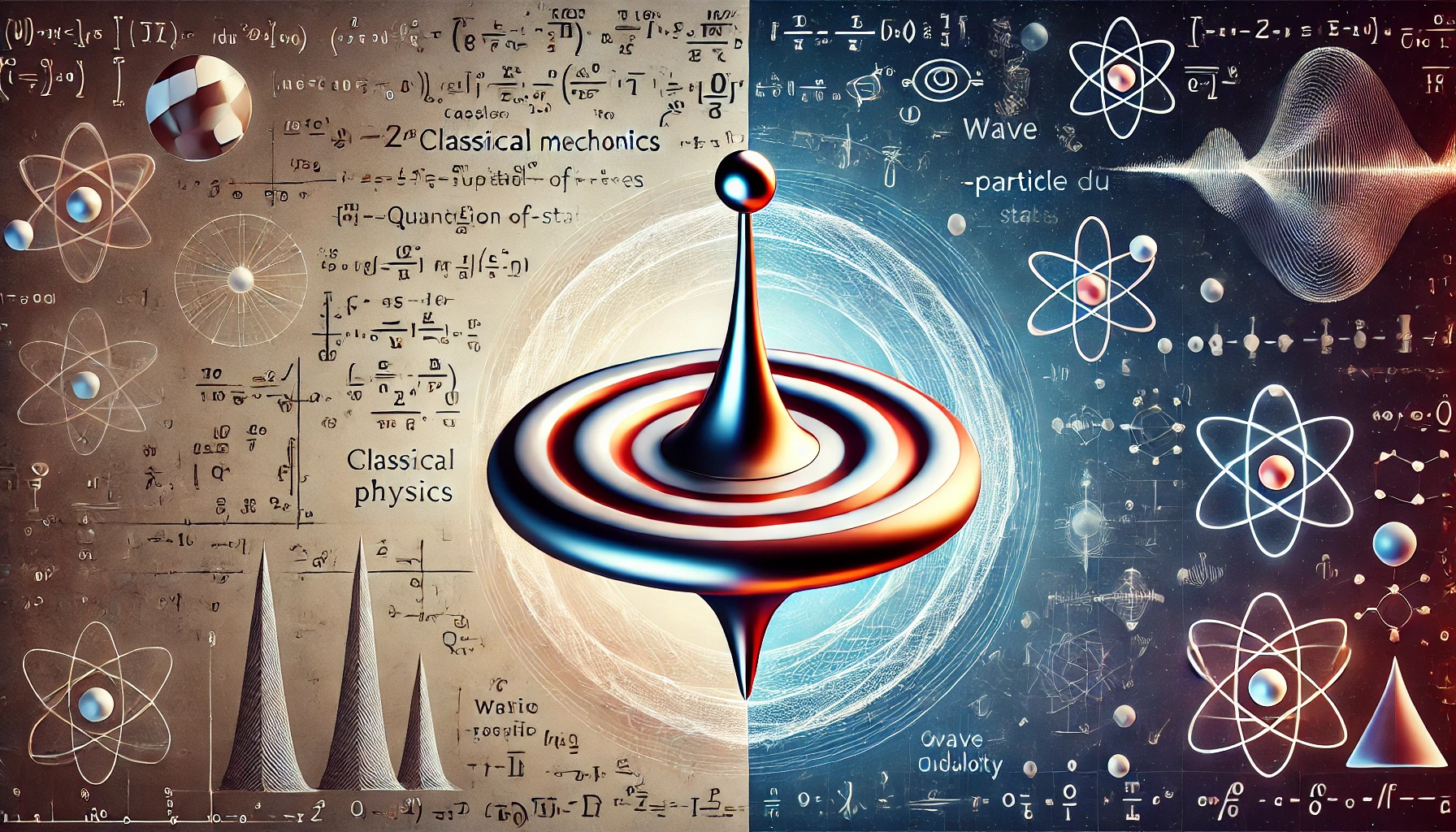While classical mechanics can accurately predict the state of an object, quantum mechanics explains that mutually exclusive states can coexist. This raises the possibility of statements that are both “true” and “false” in logic, and has important implications for technological advances such as quantum computers.
According to classical mechanics, if an object’s initial state of motion can be accurately known, regardless of its size, its state after a certain amount of time can be accurately measured, and two exclusive states cannot coexist. However, quantum mechanics, which emerged in the 20th century, has shown that mutually exclusive states can coexist in the microscopic world.
To understand the coexistence of mutually exclusive states in the microscopic world, consider a spinning top with a radius of 5 cm that is spinning in the macroscopic world. The top can be spinning either clockwise or counterclockwise. The spinning direction of the spinning top is already determined before you observe it, and you only learn about it through observation. In contrast, imagine a spinning top as small as an electron spinning in the microscopic world. The spinning top has two coexisting states: clockwise and counterclockwise. The two coexisting states of the spinning top are determined by observation to be one direction of rotation. Which of the two directions will be determined is not known before the observation. Unlike the macroscopic world, in the microscopic world governed by quantum mechanics, mutually exclusive states coexist before we observe them. Because he found it difficult to accept the idea that exclusive states coexist and that observation itself determines the state of an object, Einstein was skeptical of the interpretation of quantum mechanics, saying, “Does the moon not exist until you see it?”

These properties of quantum mechanics are not just theoretical curiosities, but have actually had a significant impact on technological advancements. Recently, researchers have been working on quantum computers that perform ultra-fast computations by applying the coexistence of mutually exclusive states. This is a great example of how the coexistence of mutually exclusive states in quantum mechanics can be realized in practice. These discoveries in the micro world fundamentally question our common sense ideas about the macro world. For example, the principles of quantum computers work in a completely different way than classical computers, which opens up amazing possibilities that are beyond our everyday understanding. Similar questions can be seen in logic.
Classical logic is a syllogistic logic where there are only two truths, “true” and “false”. And in classical logic, any statement is either ‘true’ or ‘false’. This fits well with our common sense thinking. But according to Priest, in addition to statements that are true and statements that are false, there are statements that are both true and false. To illustrate this, he introduces the “liar sentence”. To understand liar sentences, let’s distinguish between self-directed and non-self-directed sentences. A self-directed sentence is a sentence that literally refers to itself. For example, the “true” sentence, “This sentence has eighteen syllables,” points to itself and says how many syllables it has. On the other hand, a true sentence, “The capital of Peru is Lima.” is not referring to itself because it only says where the capital of Peru is.
“This sentence is false.” is a liar’s sentence. It is a self-directed sentence in which the expression “this sentence” refers to the sentence itself and says that it is false. So why does Priest think that liar sentences should be labeled “true and false”? To answer this, let’s first assume that a liar sentence is true. Then a liar sentence is false, because a liar sentence is a sentence that points to itself and says that it is false. On the other hand, suppose the liar’s sentence is “false,” then the liar’s sentence is “true,” because that’s what it says. In any case, according to Priest, a liar sentence is a sentence that is ‘both true and false’. He gives a number of examples to support the existence of truth statements that are both true and false in addition to liar statements. In particular, he argues that the coexistence of mutually exclusive states in quantum mechanics suggests this.
Since classical logic cannot handle sentences with truth values that are both true and false, Priest proposes a non-classical logic, LP*, that can. However, some intuitively appealing rules of inference do not hold in LP. Consider the rule of premise affirmation. In classical logic, the converse is true. This is the conditional statement “If P, then Q.” If its antecedent, P, is true, then its consequent, Q, must be true. In a similar way, in LP, for a predicate-positive rule to hold, if the conditional and its antecedent P are both true or true and false, then its consequent Q must also be true or true and false. However, if the antecedent of a conditional in LP is ‘true and false’ and the consequent is ‘false’, then both the conditional and the antecedent are ‘true and false’, but the consequent is ‘false’. Although it does not establish the rule of tautologies, LP is significant as an attempt to answer some fundamental questions about classical logic.
These developments in quantum mechanics and logic have created an important opportunity to rethink our existing body of knowledge. The microscopic nature of the world revealed by quantum mechanics is not just of interest to scientists, but also has important implications for philosophical and logical discussions. This will allow us to gain a deeper understanding of nature and the universe, and to guide future technological innovations.
